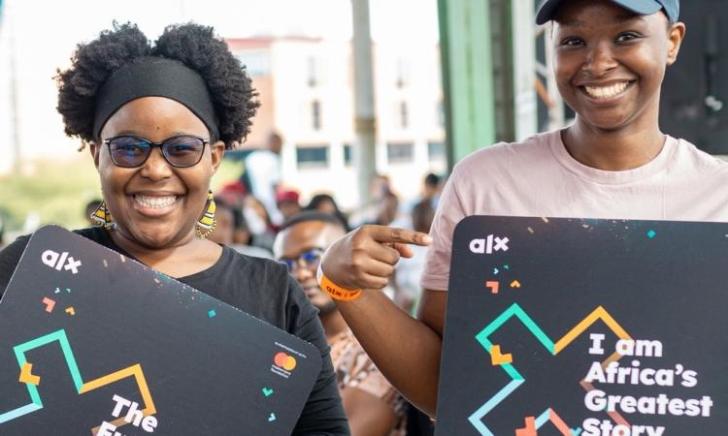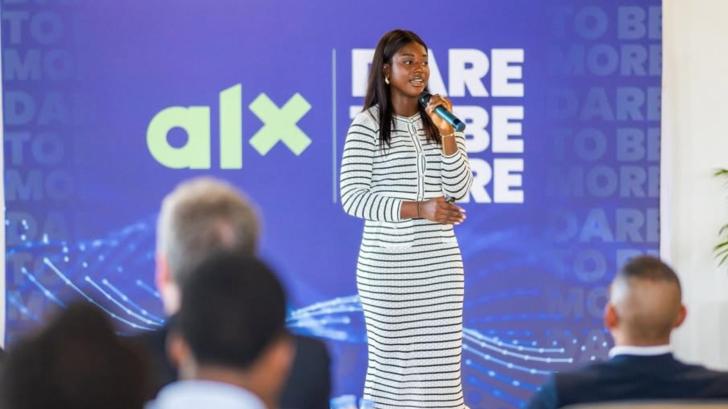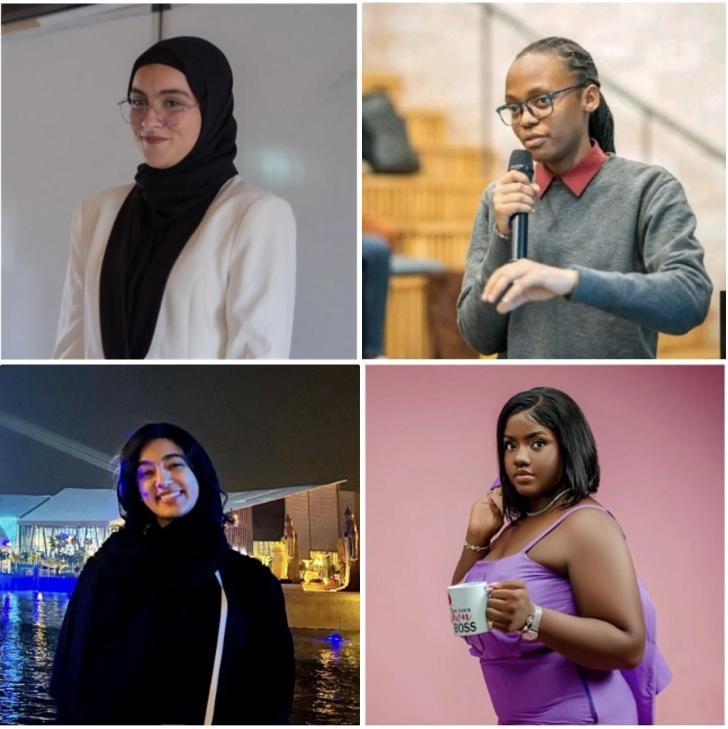Business / International
Empowering African women to thrive in a digital economy
12 Apr 2025 at 08:43hrs |
342 Views

LADX founder, Dominion Paul
Growing up with her hardworking mom in tough circumstances in Nigeria, Dominion Paul was determined to forge her path to success in a world that didn't always make space for her. When she discovered the ALX Ventures Founder's Academy, it wasn't just an opportunity to hone her digital and entrepreneurial skills - it was the beginning of a personal and professional transformation. Today, she's the founder of LADX, harnessing her skills to redefine logistics and grow a thriving business that has already employed over 90 people. Through her journey, she's reshaping perceptions of what it means to be a woman thriving in the digital economy.
Paul's story is not unique. Across Africa, a quiet transformation is taking place - women are finding their voices, their confidence, and their place in the burgeoning tech arena across Africa. This transformation is being supported by a partnership between ALX and the Mastercard Foundation, a collaboration that goes far beyond skills building. This partnership is helping to enable an ecosystem of empowerment, a gateway to untapped potential, and a lifeline to opportunity for African women ready to take on a digital-first world.
 LADX founder, Dominion Paul
LADX founder, Dominion Paul
Breaking barriers, building futures
For many decades, women across Africa have faced cultural, systemic, and economic barriers that have excluded them from the tech and entrepreneurial spaces. ALX and the Mastercard Foundation are working to rewrite the narrative by inspiring women to dare, to lead, and to innovate.
"This isn't just about gender equality in numbers. Building digital skills for women isn't a box to check - it's a necessity for Africa's future," says Sharon O'Donnell, Chief Experience Officer at ALX. "When more women are empowered to code, build, create, and lead, not only do they uplift themselves and their families, but they also generate solutions that address the unique realities of African communities. It creates a ripple effect that inspires younger generations and builds a more inclusive, sustainable society."
"Empowering African women with digital skills is not just an investment in their future, it's an investment in the future of our entire continent," says Jeniffer Ramnath, Chief Digital and Information Officer of the Mastercard Foundation. "Through this partnership, we can address the skills gap, foster lifelong learning, and create opportunities for African women to thrive."
Why tech needs women
The digital world has long been male-dominated, but to build a better Africa, that power structure has to change. A 2024 UNESCO report, Changing the equation: securing STEM futures for women, shows that women remain under-represented in the STEM workforce in G20 countries, particularly in the African Union. Women held 22% of STEM occupations in G20 countries in 2021, and just 14% in AU countries.
New ISS African Futures and Innovation (AFI) research shows what Africa's development could gain from more gender inclusion. Closing the gender gap could add $259 billion to Africa's economy by 2043, with the services sector gaining $174 billion in added value. In a more ambitious scenario, achieving full gender equality could result in an economy $1 trillion larger, with GDP per capita 12% higher and 80 million fewer people in extreme poverty.
Ramnath says the profound impact of bringing more women into tech lies in their ability to innovate, inspire and lead. "Through our programs, we are witnessing firsthand how digital skills can empower women to become changemakers. These women are not just participants in the digital economy, they are pioneers, innovators, and leaders."
ALX Chief Operating Officer, Shana-Michelle Rabonda, says women bring unique perspectives to the table. "They're solving problems that others overlook, creating businesses that tackle real global and local challenges, and driving innovations in areas like healthcare, education, and financial inclusion."
This strong focus on supporting women is paying off - over 50% of those who complete ALX programs are women, outpacing the rest of the globe in terms of female participation, says Rabonda. "We are so encouraged about the outcomes we're witnessing from our female talent, and we strive for ways to provide support. From industry partnerships to masterclasses to supporting new ventures, we work to create an inclusive environment that empowers women to thrive."
From students to changemakers
The true beauty of the ALX ecosystem lies in its ability to create changemakers. Women like Lilian aren't just learning technical skills - doors are being opened to spaces once considered "off-limits." With over 285,000 learners enrolled across 54 African countries to date, 156,000 of them female, stories of ALX alumni success and impact abound across the continent.
Across Africa, ALX graduates are harnessing technology to drive change. Women like Ait Mbarek Oumaima, a biomedical engineer in Morocco, who innovates in telemedicine and champions healthcare transformation. Branice Otiende, a Kenyan tech entrepreneur, is shaping a more inclusive future through technology with Signvrse, an AI-powered platform building Africa's largest sign language motion dataset.
Egypt's Samar Elghalban, founder of Edulga, is transforming global education with a Web3-enabled platform that empowers students to become lifelong learners. Deborah Falope, Co-Founder and COO of AquaTrack, is developing Nigeria's aquaculture industry with a Bluetech platform that empowers small-scale farmers.
​
Each of these stories starts with a single step - a leap of faith into the ALX ecosystem, where societal and financial barriers give way to the promise of something better. Beyond education, ALX builds a full community that fosters entrepreneurial mindsets and career growth through mentorship, peer support, and real-world skills and application. Access to opportunities such as university scholarships, entrepreneurship funding, and local and global roles are available. With thirteen university partners (and counting), ALX and the Mastercard Foundation are able to provide access to opportunities that once felt impossible.
Transforming Africa through partnerships
Africa's future depends on collaborative action from all sectors to unlock this potential. Businesses can contribute to this transformation by being active co-creators of solutions and working with governments, philanthropy and wider civil society. The partnership between ALX and the Mastercard Foundation goes deeper than teaching women to code - it's about transforming Africa itself. There is a shared mission to deliver impact. "By empowering women to thrive in the digital economy, we're ensuring that the African continent is a key player on the world stage. We're seeing women start businesses, step into global tech careers and solve challenges that hold us back," says O'Donnell.
The future of Africa is her
Tech needs her, innovation needs her, and transformation will not happen without her. ALX and the Mastercard Foundation know this, and together, they are supporting the creation of an ecosystem that doesn't just open doors for women - it tears down the walls that have kept them locked out.
"The true power of digital upskilling lies in its ability to transform lives," Ramnath concludes. "When women gain digital skills, they not only enhance their own prospects but also drive innovation and growth within their communities."
Paul's story is not unique. Across Africa, a quiet transformation is taking place - women are finding their voices, their confidence, and their place in the burgeoning tech arena across Africa. This transformation is being supported by a partnership between ALX and the Mastercard Foundation, a collaboration that goes far beyond skills building. This partnership is helping to enable an ecosystem of empowerment, a gateway to untapped potential, and a lifeline to opportunity for African women ready to take on a digital-first world.
 LADX founder, Dominion Paul
LADX founder, Dominion PaulBreaking barriers, building futures
For many decades, women across Africa have faced cultural, systemic, and economic barriers that have excluded them from the tech and entrepreneurial spaces. ALX and the Mastercard Foundation are working to rewrite the narrative by inspiring women to dare, to lead, and to innovate.
"This isn't just about gender equality in numbers. Building digital skills for women isn't a box to check - it's a necessity for Africa's future," says Sharon O'Donnell, Chief Experience Officer at ALX. "When more women are empowered to code, build, create, and lead, not only do they uplift themselves and their families, but they also generate solutions that address the unique realities of African communities. It creates a ripple effect that inspires younger generations and builds a more inclusive, sustainable society."
"Empowering African women with digital skills is not just an investment in their future, it's an investment in the future of our entire continent," says Jeniffer Ramnath, Chief Digital and Information Officer of the Mastercard Foundation. "Through this partnership, we can address the skills gap, foster lifelong learning, and create opportunities for African women to thrive."
Why tech needs women
The digital world has long been male-dominated, but to build a better Africa, that power structure has to change. A 2024 UNESCO report, Changing the equation: securing STEM futures for women, shows that women remain under-represented in the STEM workforce in G20 countries, particularly in the African Union. Women held 22% of STEM occupations in G20 countries in 2021, and just 14% in AU countries.
New ISS African Futures and Innovation (AFI) research shows what Africa's development could gain from more gender inclusion. Closing the gender gap could add $259 billion to Africa's economy by 2043, with the services sector gaining $174 billion in added value. In a more ambitious scenario, achieving full gender equality could result in an economy $1 trillion larger, with GDP per capita 12% higher and 80 million fewer people in extreme poverty.
Ramnath says the profound impact of bringing more women into tech lies in their ability to innovate, inspire and lead. "Through our programs, we are witnessing firsthand how digital skills can empower women to become changemakers. These women are not just participants in the digital economy, they are pioneers, innovators, and leaders."
ALX Chief Operating Officer, Shana-Michelle Rabonda, says women bring unique perspectives to the table. "They're solving problems that others overlook, creating businesses that tackle real global and local challenges, and driving innovations in areas like healthcare, education, and financial inclusion."
From students to changemakers
The true beauty of the ALX ecosystem lies in its ability to create changemakers. Women like Lilian aren't just learning technical skills - doors are being opened to spaces once considered "off-limits." With over 285,000 learners enrolled across 54 African countries to date, 156,000 of them female, stories of ALX alumni success and impact abound across the continent.
Across Africa, ALX graduates are harnessing technology to drive change. Women like Ait Mbarek Oumaima, a biomedical engineer in Morocco, who innovates in telemedicine and champions healthcare transformation. Branice Otiende, a Kenyan tech entrepreneur, is shaping a more inclusive future through technology with Signvrse, an AI-powered platform building Africa's largest sign language motion dataset.
Egypt's Samar Elghalban, founder of Edulga, is transforming global education with a Web3-enabled platform that empowers students to become lifelong learners. Deborah Falope, Co-Founder and COO of AquaTrack, is developing Nigeria's aquaculture industry with a Bluetech platform that empowers small-scale farmers.
​

Each of these stories starts with a single step - a leap of faith into the ALX ecosystem, where societal and financial barriers give way to the promise of something better. Beyond education, ALX builds a full community that fosters entrepreneurial mindsets and career growth through mentorship, peer support, and real-world skills and application. Access to opportunities such as university scholarships, entrepreneurship funding, and local and global roles are available. With thirteen university partners (and counting), ALX and the Mastercard Foundation are able to provide access to opportunities that once felt impossible.
Transforming Africa through partnerships
Africa's future depends on collaborative action from all sectors to unlock this potential. Businesses can contribute to this transformation by being active co-creators of solutions and working with governments, philanthropy and wider civil society. The partnership between ALX and the Mastercard Foundation goes deeper than teaching women to code - it's about transforming Africa itself. There is a shared mission to deliver impact. "By empowering women to thrive in the digital economy, we're ensuring that the African continent is a key player on the world stage. We're seeing women start businesses, step into global tech careers and solve challenges that hold us back," says O'Donnell.
The future of Africa is her
Tech needs her, innovation needs her, and transformation will not happen without her. ALX and the Mastercard Foundation know this, and together, they are supporting the creation of an ecosystem that doesn't just open doors for women - it tears down the walls that have kept them locked out.
"The true power of digital upskilling lies in its ability to transform lives," Ramnath concludes. "When women gain digital skills, they not only enhance their own prospects but also drive innovation and growth within their communities."
Source - connectmedia.co.za
Join the discussion
Loading comments…



























